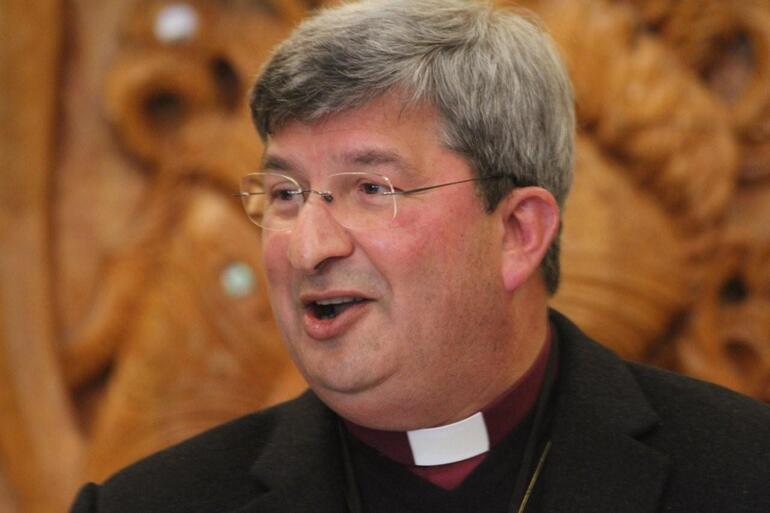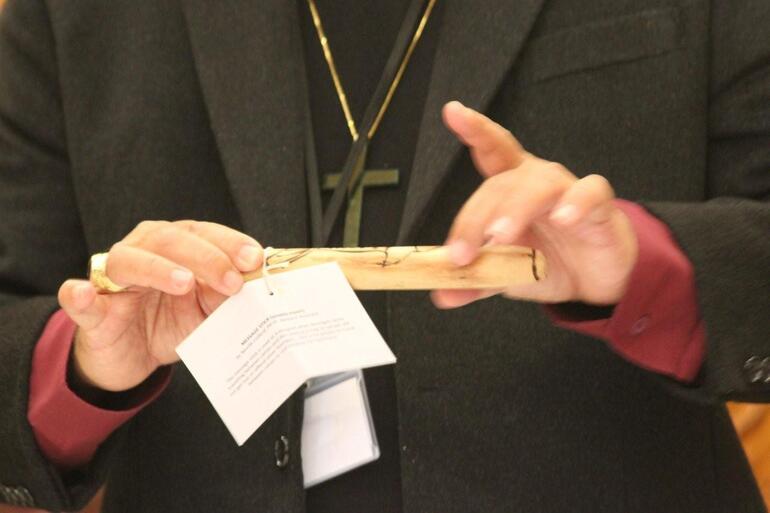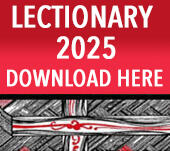

According to Archbishop Roger Herft, priests could gain much by considering the implications of the digital memory stick – and the 3500 year-old Aboriginal message stick.
The memory stick, he said, is valuable because it provides us “with a record of the past through the living text filtered through scripture, tradition, reason and experience”.
Without it, he said, “we become a textless community and, as Walter Brueggemann reminds us, ‘a textless Jew is no Jew at all’. So (too) a textless Christian is not a Christian with a living memory…”
But he suggested the priest ought to ponder the meaning of the ancient Aboriginal message stick, too.
“The message stick,” he said, “is a vital part of tribes and nations of the Aboriginal people of Australia speaking heart and mind, Dreamtime, mystery and meaning to one another.
These small wooden sticks, which carry carving, burn marks, or ash painting “provided the means by which people across the continent were called to gather, to consider peace or to tell of things that were yet to happen.
“The key figure in all of this was the bearer of the message stick.
“He was granted diplomatic immunity. He had watched intensely the message being created. He heard the message being chanted over the stick, he imbibed it into his spirit and he then was blessed and sanctified to carry the message stick. It became his passport, his protective talisman.
“The stick had an authenticity of its own. The stick bearer was the living intermediary between the message contained in the stick and those who received this stick.”
At the time of his installation as Archbishop, Roger Herft was given such a message stick by an Elder of the Noongar people of Western Australia.
On this stick was inscribed a dolphin – and therefore a reminder to Archbishop Herft to be “playful and trusting of God in the midst of the responsibilities of Episcopal ministry.”
Fishermen tell tales of dolphins helping them by herding fish into their nets, and Archbishop Herft also took this as an encouragement that Jesus would always be with him, and “that a rich harvest will be fulfilled” .
The message stick, he continued, “is a living, interactive entity” and it should be considered with the memory stick in “a dynamic mutuality in which past, present and future are brought together, enabling the leader to discover authenticity – to stand with dignity, poise and purpose.”
“As I contemplate the leaders of the future, I pray that the memory stick of the 21st century, and message stick of 35 centuries ago may be companions on the journey.”
Archbishop Herft also suggested church leaders in 2020 would have to be able to lead people in four distinct ways:
1. Leaders, he claimed, are to lead people in ‘doxology’ – they are bearers of praise.
“Leaders are firstly proclaimers and bearers of cosmic liturgy,” he said, “enabling humans to be engaged… in praise.”
And leaders of 2020 “must have this vision of the priesthood of cosmic liturgy at its centre.”
2. They are also called to be reconcilers.
“They know what it is to sin," he said. "to fall, to be broken, to hate, to know deep down the desire for resentment and revenge – yet know that to let this cycle prevail is to become what you hate.”
3. Church leaders in 2020 will also be those who know how to deal with rejection.
He reflected on the story of Cain and Abel, and on how God’s refusal of Cain’s gift angered Cain and led him to slaying his brother.
He quoted Rabbi Jonathan Sacks on the implications of that forsaken gift, and that murder: “Even among primates," said Rabbi Sacks, "the alpha male exercises power by distributing food, giving gifts. When the refusal of gift leads to anger, it shows that the initial act was not altruism but a form of egoism: I give, therefore I rule.”
The Archbishop continued: “There are some interesting challenges for leadership in a world where people do not accept our offerings, our message of the Gospel, the alternative way of forgiveness we present.”
4. Finally, future leaders will know the difference between holding on to people as partners, and being their keepers.
“In the aftermath of the first murder,” said Archbishop Herft, “The Lord God whom Cain has tried to overpower/placate/bargain with in his first offering speaks: ‘Where is your brother?’… Cain’s response is: ‘I do not know – am I my brother’s keeper?’
Future leaders will also know the difference between “holding on to people as partners, not keepers.”
“One of the great temptations in leadership,” said Archbishop Herft “is to become keepers rather than partners.
“The ethic that Christ calls us to must go beyond the concept of ‘keeping.’ The world is full of people whose lives are destroyed by the ‘keeping’ mentality…”

















Comments
Log in or create a user account to comment.